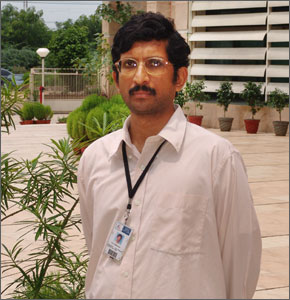Dr. Ramakrishnan Sitaraman started his research career with a detailed study of a phase-variable restriction-modification systems in the rat pathogen, Mycoplasma pulmonis during his doctoral work at the University of Alabama at Birmingham, U.S.A. Thereafter, he worked at the National Institutes of Health (NIH), U.S.A., where he contributed to the development strains of Bacillus anthracis deficient in either proteases or restriction enzymes. The protease-deficient strain is now listed as an invention available for licensing from the NIH. Subsequently, at Vanderbilt University, U.S.A., he investigated signaling events in cell lines induced by Helicobacter pylori phospholipases, and developed a novel assay to evaluate synergistic hemolysis. His doctoral and post-doctoral work amount to a total research experience of 13 years before joining TERI university.
Since joining TERI University in 2007, Dr. Ramakrishnan has made major contributions to institutional development. He served as a founding faculty member for two academic programmes at TERI University - M.Sc. in Plant Biotechnology and Advanced Post-graduate Diploma in Regulations in Agricultural Biotechnology, and served as the programme coordinator of the M.Sc. programme from commencement and during most of its existence. He contributed significantly to laboratory establishment and development at the then-nascent campus of TERI University at Vasant Kunj. In 2011, he served as the founding head for the Department of Biotechnology at TERI University, and in 2012 as the founding chairman for the Institutional Biosafety Committee. He has filed two Indian patent applications that are also the first ever patents filed by TERI University.
Dr. Ramakrishnan"s research interests are in the areas of microbial pathogenesis and genetics, gene regulation, restriction-modification systems and science education. The Life Sciences Research Board (Defence Research and Development Organisation) and the Department of Biotechnology (Government of India) have funded his research. In 2011, in recognition of his contributions to pedagogy and publications on science education in peer-reviewed international journals, he was invited as a Visiting Scientist by the Homi Bhabha Centre for Science Education, Mumbai, a national institute of the Tata Institute of Fundamental Research. Besides his research and teaching, he has rendered professional service as an ad hoc reviewer for international journals and for the DST.
| |
Accepting Ph.D. students starting July 2025: Yes
Accepting post-doctoral fellows: Yes
|
- 2015 - Travel Grant, American Society for Microbiology, U.S.A. and the Society for Biosafety, India
- 2011 - Visiting Scientist, Homi Bhabha Centre for Science Education, Mumbai, India
- 2005 - 2006 Research Fellow, Vanderbilt University, Nashville, U.S.A.
- 2003 - Staff Recognition Award, National Institutes of Health, U.S.A.
- 2001 - 2004 Visiting Fellow, National Institutes of Health, Bethesda, U.S.A.
- 2000 - Student Travel Grant, International Organization for Mycoplasmology, U.S.A..
- 2000 - 2001 Post-doctoral Fellow, University of Alabama at Birmingham, U.S.A.
- 1999 - Award of Special Merit for Poster Presentation, American Society for Microbiology, U.S.A.
- 1999 - Academic Excellence Award, Center for International Programs, University of Alabama at Birmingham, U.S.A.
- 1998 - Student Travel Grant, International Organization for Mycoplasmology, U.S.A.
- 1996 - Student Travel Grant, International Organization for Mycoplasmology, U.S.A.
- 1993 - Certificate of Excellence, National Institute of Information Technology, India
- 1991 - Project award, Grasim Industries Limited, India
- 1991 - Bhavishya Jyoti Scholarship, National Institute of Information Technology, India

